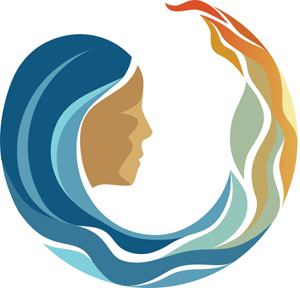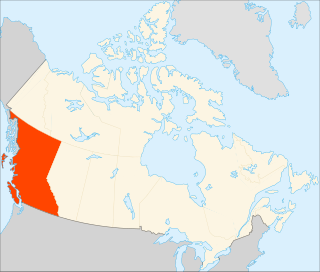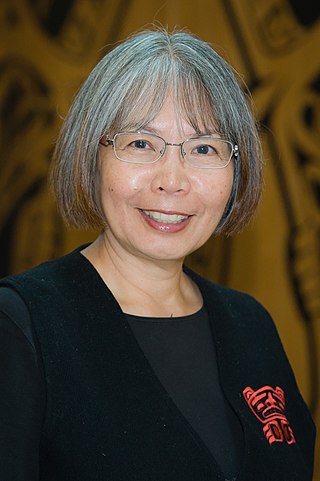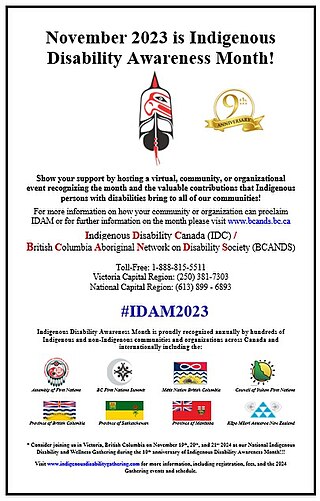
Lillooet is a district municipality in the Squamish-Lillooet region of southwestern British Columbia. The town is on the west shore of the Fraser River immediately north of the Seton River mouth. On BC Highway 99, the locality is by road about 100 kilometres (62 mi) northeast of Pemberton, 64 kilometres (40 mi) northwest of Lytton, and 172 kilometres (107 mi) west of Kamloops.

The Canadian Institutes of Health Research is a federal agency responsible for funding health and medical research in Canada. Comprising 13 institutes, it is the successor to the Medical Research Council of Canada.
Foster children in Canada are known as permanent wards. A ward is someone, in this case a child, placed under protection of a legal guardian and are the legal responsibility of the government. Census data from 2011 counted children in foster care for the first time, counting 47,885 children in care. The majority of foster children – 29,590, or about 62% – were aged 14 and under. The wards remain under the care of the government until they "age out of care." This age is different depending on the province.
Jeannette Christine Armstrong is a Canadian author, educator, artist, and activist. She was born and grew up on the Penticton Indian reserve in British Columbia's Okanagan Valley, and fluently speaks both the Syilx and English language. Armstrong has lived on the Penticton Native Reserve for most of her life and has raised her two children there. In 2013, she was appointed Canada Research Chair in Okanagan Indigenous Knowledge and Philosophy.
Edward John is a prominent First Nations political leader in Canada.

The Native Women's Association of Canada is a national Indigenous organization representing the political voice of Indigenous women, girls, and gender-diverse people in Canada, inclusive of First Nations on and off reserve, status and non-status, disenfranchised, Métis, and Inuit. An aggregate of Indigenous women's organizations from across the country, NWAC was founded on the collective goal to enhance, promote, and foster the social, economic, cultural and political well-being of Indigenous women within their respective communities and Canadian societies.

Higher education in British Columbia is delivered by 25 publicly funded institutions that are composed of eleven universities, eleven colleges, and three institutes. This is in addition to three private universities, five private colleges, and six theological colleges. There are also an extensive number of private career institutes and colleges. Over 297,000 students were enrolled in post-secondary institutions in British Columbia in the 2019-2020 academic year.
Compulsory sterilization in Canada has a documented history in the provinces of Alberta, Saskatchewan, and British Columbia. In 2017, sixty indigenous women in Saskatchewan sued the provincial government, claiming they had been forced to accept sterilization before seeing their newborn babies.
Martin T. Schechter is a Canadian epidemiologist recognized for contributions to research about HIV prevention and treatments, addiction research, and Indigenous health research. He is a professor and was the founding director of the School of Population and Public Health in the Faculty of Medicine at the University of British Columbia (UBC). Schechter received his Order of British Columbia in 1994 alongside BC's first Nobel Prize laureate Michael Smith and noted Indigenous artist Bill Reid. In 2022, Schechter was named as a Member of the Order of Canada.

Nadine Rena Caron FACS, FRCSC,, is a Canadian surgeon. She is the first Canadian female general surgeon of First Nations descent (Ojibway), as well as the first female First Nations student to graduate from University of British Columbia's medical school.

Kelvin Redvers is a producer and film director who belongs to the Deninu Kųę́ First Nation.
Indigenous peoples of Canada are culturally diverse. Each group has its own literature, language and culture. The term "Indigenous literature" therefore can be misleading. As writer Jeannette Armstrong states in one interview, "I would stay away from the idea of "Native" literature, there is no such thing. There is Mohawk literature, there is Okanagan literature, but there is no generic Native in Canada".

Janice Forsyth is a Canadian associate professor of Sociology and the director of the Indigenous Studies program at Western University in London, Ontario. A former varsity athlete Forsyth was awarded the Tom Longboat Regional Award for Ontario in 2002.

Jo-Ann Archibald, also known as Q’um Q’um Xiiem, is an Indigenous studies scholar from the Sto:lo First Nation in British Columbia, Canada.
Madam Justice Renu Mandhane is a Canadian jurist and lawyer who was appointed a judge of the Ontario Superior Court of Justice (Brampton) on May 22, 2020.
The Aboriginal Sport Circle (ASC) is a not-for-profit organization that was founded in 1995. It is designated as Canada's governing body and voice for Aboriginal sport throughout the country. The ASC brings together the athletic interests of First Nations, Inuit, and Metis communities, to increase and promote physical health among indigenous populations. The ASC also gives out the national Tom Longboat Award to the outstanding male and female Aboriginal athlete in Canada each year.
Bill Wilson is a hereditary chief, politician, and lawyer. He carries the Kwak’wala name Hemas Kla-Lee-Lee-Kla. Hemas means “the Chief who is always there to help” and Kla-Lee-Lee-Kla means “the first rank among the eagles.” He is a descendant of the Musgamgw Tsawataineuk and Laich-kwil-tach peoples, which are part of the Kwakwaka'wakw, also known as the Kwak’wala-speaking peoples.

Jim Boucher is a Cree and Dene Indigenous Canadian businessman and political leader. As an elected chief, he represented the Fort McKay First Nation (FMFN),. He established the Fort McKay Group of Companies in 1986, and continued to be chairman and president of the Fort McKay Group of Companies (1986–2019), president of the Athabasca Tribal Council (ATC), grand chief of Treaty 8 First Nations of Alberta, vice-chairperson, Board of Governors of Keyano College in Fort McMurray, Alberta, and chairperson for the National Aboriginal Economic Development Board.

Indigenous Disability Awareness Month is an annual Canadian observance created in 2015 by Indigenous Disability Canada / British Columbia Aboriginal Network on Disability Society (IDC/BCANDS) and is observed/recognized by various government, communities and organizations across Canada and internationally. Indigenous Disability Awareness Month is believed to be the only Indigenous disability-specific, recognized observance in the world.
Patrick Reid Stewart, (Luugigyoo) is a Canadian-born Nisga’a architect, designer and educator based out of British Columbia. “Dr. Patrick Stewart, a citizen of the Nisga'a Nation in north-western British Columbia has been operating his architectural practice in Sto:lo territory in Chilliwack, B.C. since 1997.” Stewart is the first Aboriginal person in British Columbia to own and operate an architectural firm and consequently his works have a First Nations community development focus. He heads the Provincial Indigenous Homelessness Committee in BC, as well as the Indigenous Task Force for the Royal Architectural Institute of Canada, and was the first Aboriginal president of an architectural association, the Architectural Institute of British Columbia. Stewart is also an adjunct professor of Architecture at Laurentian University for the McEwen School of Architecture in Sudbury, Ontario.










